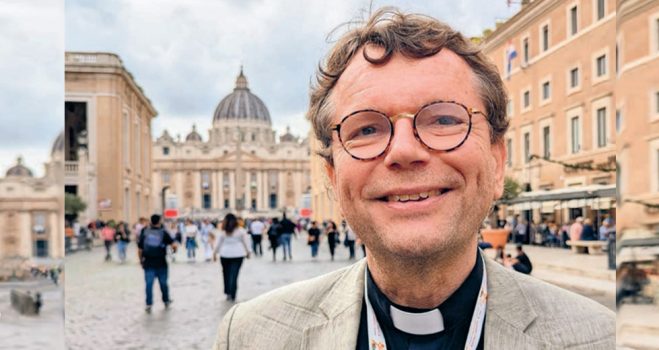In an unprecedented step toward bridging Christian traditions, the World Communion of Reformed Churches (WCRC) recently engaged in the Catholic Church’s Synod of Bishops, which took place over several weeks in October. Represented by Rev. Dr. Hanns Lessing, executive secretary for Communion and Theology, the WCRC’s participation underscores a growing ecumenical collaboration based on shared values, mutual respect, and a joint commitment to justice and inclusion.
For Lessing, this deep immersion within the Vatican’s historic walls was both puzzling and inspiring. Each day began with passing the Vatican’s renowned Swiss Guards and entering sacred halls steeped in ritual and history. “We, as Reformed people, aren’t accustomed to this level of protocol,” Lessing remarked, referring to the distinct “imperial” grandeur of Catholic ceremonies. “As Reformed churches, we question the forms of Empire,” he said. Yet, beneath the formalities, he found a spirit of openness, dialogue, and a willingness to examine the Catholic Church critically—qualities that resonated with the Reformed commitment to self-reflection and communal discernment.
Synodality in Action: A Shared Tradition of Communion and Dialogue
Lessing shared that the WCRC has maintained a consistent dialogue with the Roman Catholic Church for over fifty years. With Pope Francis’ invitation for Christian partners to participate in the Synod, the WCRC embraced the opportunity, seeing it as a natural extension of the Reformed commitment to synodality. All WCRC member churches embody synodal governance, where the entire church engages in decision-making and spiritual discernment.
The invitation to the Synod came at a pivotal time when many Christian communities are re-evaluating their approaches to governance and inclusion. The Catholic Church’s evolving approach to inclusivity, which explicitly includes people from the margins, reflects a shift similarly echoed in the WCRC’s work, particularly through the Accra Confession—a 2004 theological document addressing economic injustice and environmental crises from a justice-centered perspective. Pope Francis’ outspoken advocacy for justice has created a shared platform that invites Catholic and Reformed churches to address urgent matters like climate change and poverty together. As Lessing explained, “We see a Church committed to justice and prophetic action in the face of crisis, which is foundational to our own Reformed beliefs.”
Conversations in the Spirit: The Influence of Reformed Tradition
The Synod’s discernment, emphasizing “conversations in the Spirit” over debate, struck a profound chord with Lessing. This focus on listening, reflection, and silence aligns closely with the Reformed tradition’s approach to discernment, which values community-driven insights. Inspired by the similarities, Lessing noted, “The Jesuit practice of spiritual discernment reminds us of our own tradition, where spiritual insight is valued over parliamentary confrontation.” This openness was challenging for some bishops, but several of them described the experience as “liberating.”
For Lessing, observing this process firsthand reaffirmed the potential for dialogue-centered decision-making to bridge divides. Reflecting on his own Reformed roots, he noted that 16th-century Reformed synods also emphasized consensus over majority rule—a practice that the WCRC is rediscovering today. “We’re rediscovering the importance of communal grace—a grace that values each voice and fosters unity over contention,” Lessing reflected.
A Model for Modern Dialogue
Lessing and other Protestant observers found the Catholic Synod’s approach a compelling model to address the tensions in today’s polarized society. They remarked that their own synods sometimes felt “too parliamentary” in contrast, with the Catholic Synod’s non-confrontational approach offering a meaningful alternative. However, Lessing acknowledged the challenges inherent in this model, particularly in moving from listening to decisive action. “The question is how to transition from listening to actionable decisions,” he noted. “The Synod hasn’t yet fully resolved this, but the commitment to try is invaluable.”
Openness and Hospitality: A Welcoming Catholic Church
Lessing described a spirit of openness during his time at the Vatican, marking it as a milestone for ecumenical engagement. Reformed participants were fully integrated into Synod discussions, joining Catholic leaders in table conversations and plenary sessions. Although non-Catholic participants did not have voting rights, their contributions were met with attentiveness and respect, fostering an inclusive atmosphere, particularly when faced with complex questions.
A notable topic of discussion was Eucharistic hospitality. While formal guidelines have yet to be established, a working group has been formed to explore the issue, raising hopes that one day, ecumenical participation in the Eucharist may be possible. This possibility remains a point of aspiration for the Reformed community, which views Eucharistic hospitality as a profound expression of Christian unity.
A Protestant Collar at the Vatican: A Symbol of Shared History
Lessing’s Protestant collar sparked curiosity among Catholic attendees, leading to discussions about its origins. “The collar actually originates from Scotland, from the Presbyterian and thus Calvinist tradition,” he explained, laughing at the shared history that links the two traditions. This lighthearted exchange highlighted the unexpected commonalities that bridge centuries of theological divergence, fostering a sense of camaraderie among Synod participants.
Looking Ahead: A Shared Mission for the Future
Reflecting on the Synod’s legacy, Lessing emphasizes that the WCRC’s ecumenical involvement is not limited by institutional boundaries; it is a partnership that brings the insights of the Reformed tradition into the broader Christian conversation. In an era marked by division, the WCRC’s presence in the Synod signals a hopeful step toward mutual respect and a shared vision, as both Reformed and Catholic communities look toward a future of unity and collaborative mission.
Link to the article of Rev. Dr. Hanns Lessing from Nederlands Dagblad in Dutch language.


